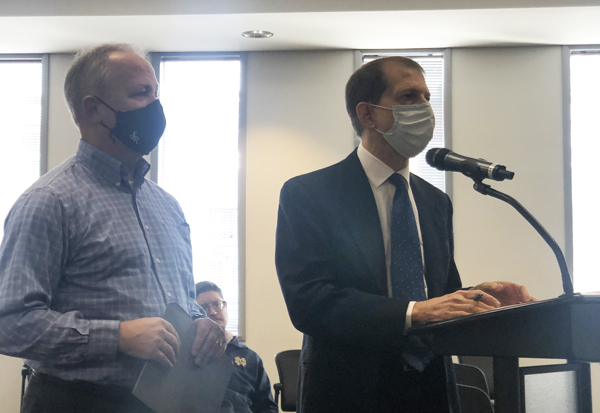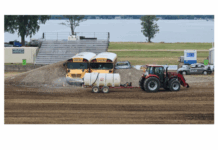
Thousands of Catholics from northern Indiana and beyond are expected to come to Warsaw June 19 for a historic Eucharistic procession to proclaim their faith.
On Friday, the Warsaw Board of Public Works and Safety approved the road closures for the walking Eucharistic procession. It will start at Sacred Heart, go west on Main Street, north on Indiana Street, east on Canal Street, north on Ind. 15 to Gilliam Avenue and end at Our Lady of Guadalupe Church for a festival. Fort Wayne Street, between Lincoln and Harrison streets, also will be closed. Paperwork filed with the city indicates the road closures will be between 1 and 6 p.m., with the event starting at 3 p.m.
Dan Hampton and Chris Langford, representing the Fort Wayne/South Bend Diocese, made the requests to the Board of Works for the road closures.
Warsaw Mayor Joe Thallemer said, “It’s going to be a rather large event. They’re here requesting road closures. I know the police department has worked with Dan and the Diocese regarding State Road 15.”
Hampton said the June 19 event that they’re in the process of planning is called the Eucharistic procession. He said Langford is the procession chairperson and he is “only in position of logistics, so I got the road closure request.”
The procession will stop at Central Park for about 10 to 15 minutes before proceeding up Ind. 15 to Our Lady of Guadalupe.
“The procession is expected to take two hours between the hours of 3 p.m. and 5 p.m., and then there will be a festival at Our Lady of Guadalupe that will go until 7 or 8 o’clock that night, but the roads, of course, will be reopened by then,” Hampton said.
He said they’re in the process of talking with the Indiana Department of Transportation about Detroit Street (Ind. 15N). “We already have that well underway, and we don’t see any problems really with the closure of that street.”
Hampton said businesses have not yet been contacted about the road closures, but it was his plan to contact all the businesses on Ind. 15 in March with a letter and a face-to-face meeting.
He said all the neighbors on Main Street will be provided with letters so they all will know what’s going on.
“We don’t want any surprises at all,” Hampton said. “We’re also going to produce some type of lawn signs that we can put right next to the road, probably the day before the event, on Saturday, the 18th, and then that way everyone can remember what we talked about when we went to their door.”
Thallemer noted the procession is a Sunday afternoon. Hampton said, “As far as the Catholic calendar, that’s also Corpus Christi Sunday so that’s why it’s being held that day.”
Langford said the procession and the festival are the “kickoff for the participation of our diocese in a national Eucharistic revival. It’s three years, a major event in the church. It’s not happened here in our country before, and this is a fitting inauguration for that. It’s diocese-wide, so it’ll be the faithful from all across the diocese – Fort Wayne, South Bend – will be coming. We expect several thousand. And the only thing I would add to what Dan said is that we’ll ensure that we have a clean-up crew and that everything is put back into place just as it was before we used it.”
Warsaw Police Department Capt. Joel Beam said, “We actually have received the permit to close State Road 15 on that day, working with INDOT, so from that perspective we are good to go.”
Thallemer said all the city departments are aware of what’s happening on June 19. He told Hampton that if he needed any assistance with the police, parks or the mayor’s office to let them know. Hampton replied he was “very happy” with the help he’s received and will receive from the city.
What Is Eucharist?
In a telephone call after the meeting, Sacred Heart Catholic Church pastor Father Jonathan Norton explained what the Eucharist is and why it’s important.
“On the night that Jesus had the last supper, according to Gospel, when he took bread and had that last meal and said, ‘This is my body, do this in remembrance of me,’ and gave it to apostles, and then turned and took a cup with wine and said, ‘This is my blood, do this in remembrance of me,’ and gave it to them, he was establishing a memorial that all Christians should participate in, that the Church would participate in, of actually receiving his body and his blood. It’s not just a symbol for us, but a reality that the substance of the bread and the wine become his body and blood,” Norton said.
“When an ordained minister, through the power of Christ that’s been given to him, says those same words – ‘This is my body,’ ‘This is my blood’ – that is actually Jesus speaking through him that changed that substance from bread and wine into the body and blood of Jesus,” Norton continued. “Now, it still looks like bread and wine, it still tastes like bread and wine, but its substance, what it is, has changed.”
He said, “Whenever we go for a Eucharist procession, we’re taking that consecrated host, we’re taking the Eucharist through the streets as well as just a proclamation of our faith, to share this good news – this beautiful thing that Jesus has given to us.”
Norton said it’s also kind of an invitation as well. Whenever a country has had a great triumph or victory, they would have a procession – a parade – through the streets.
“So a Eucharistic procession is along the same line, that we’re marching with Christ who is victorious over death, to be able to share this good news with everybody around us,” he said. “It also makes visible the Church, it helps people to see the visible church. Not just a building. The building is a place we come to worship, but the church is the people. So, the people, walk with Christ through the street to share this good news with others, invite them in as well, and, again, just a way to publicly profess what we believe.”
The bishops of the United States are calling for a Eucharistic revival.
“Maybe a revival isn’t always associated with the Catholic Church, but it is something that’s happened throughout our history, so a Eucharistic revival is because of the unfortunate declining number of Catholics who are attending mass on a regular basis, declining belief over the last two decades of real belief in the presence of Jesus and the Eucharist,” he said.
“So this is a chance where, for three years, the Catholic Church is going to focus very much on this teaching and helping people to understand what Christ has left us so that we can believe and increase the faith again.”
The Fort Wayne/South Bend Diocese makes up all the Catholic churches in the 14 counties of northeast Indiana, he said. He estimated that was around 80 to 90 Catholic churches from Fort Wayne to South Bend. They are all led by Bishop Kevin Rhoades.
“(Rhoades) wanted to come to Warsaw because we’re in the central part of the diocese and because it’s a good distance to go from Sacred Heart to Guadalupe. Guadalupe is technically a shrine, so that’s a really beautiful place to have a procession,” Norton said.
He said they’ve had Eucharistic processions pretty much each year, but just around the Sacred Heart property or maybe down through the neighborhood.
“This is the first time, and probably the only time ever, that we’ll have a Eucharistic procession from Sacred Heart all the way to Guadalupe,” Norton said.
He said they’re inviting all the Catholics from northeast Indiana and beyond to come.
“You don’t have to be Catholic to participate, either. Anybody can come and walk with us if they wanted to. But they’re expecting over 2,000 people to show up for this.”
Anyone is invited to attend the festival even if they don’t or can’t take part in the procession.
“This is the biggest event and procession that we’ve ever had at Sacred Heart and Guadalupe. This is definitely a historic moment, for our two parishes, for our diocese and I would say even for Warsaw,” he said.




